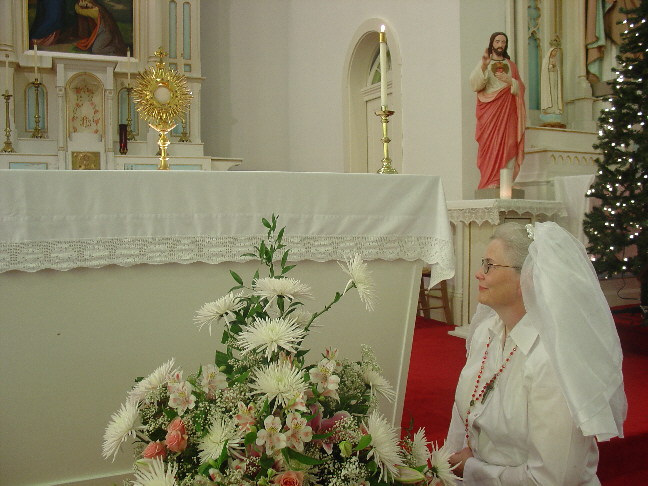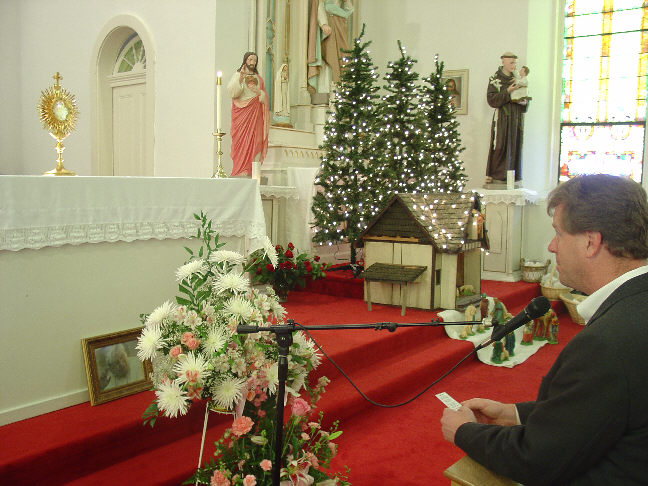Mary has requested that the daily message be given each day to the world. It is
read nightly at the prayer service from her Image Building in Clearwater, Florida, U.S.A.
This is according to her request. All attempts will be made to publish this daily message
to the world at 11 p.m. Eastern time, U.S.A.
We acknowledge that the final authority regarding these messages
rests with the Holy See of Rome.
|
 |
November 15, 2005
November 16th Holy Spirit Novena
Scripture selection is Day 8 Period I. |
The Novena Rosary
Mysteries for November 16th are Joyful. |
Pray for Andrew who has cancer.
Pray for urgent intention and all involved.
November Retreat
Mass Schedule
Wednesday - November 16th - 1:00pm
Wednesday 16th
Special Synopsis
Fatima
Mary's Apparitions
Apparitions Around the World
Contacting World
End Retreat
November 15, 2005
Messenger:
Relationships must
be pure.
Impurities in relationships is taught
in families from generation to generation.
In an alcoholic and dysfunctional
family, for example, if the husband
is an alcoholic with unpredictable
behavior, the wife can allow herself,
to be "sucked" into a relationship of
dysfunction that hurts herself and
the other members of the family.
These dysfunctional relationships
can be perceived as "normal" by one
who has lived in a dysfunctional home,
when in fact they are abnormal.
These patterns are taught to
children and can be passed on until
someone who has been affected
seeks recovery and works to change
them.
The old line, "I found my love
across a crowded room," may not be
a myth for one who knows this dysfunctional
life can pick a spouse across a crowded
room that will carry on these sick
behaviors of living with them.
In abusive and alcoholic situations
a co-dependency can occur where, for
example, the wife of an alcoholic
husband can enable him to continue
in his dysfunction.
In adult children of alcoholic groups of
recovery, many times, they must
distance themselves for a short
period to get themselves out of an
unhealthy scenario done at home.
Adult children of alcoholics
may discover their problems when
trying to interact in intimate
relationships at an older age,
30, 40 etc.
In a family of dysfunctional
behavior, Christmas may be a time
of pain as some anticipate going
home and then go home to the
family who may unconsciously
try to enforce the roles of scapegoat,
hero, etc. as the family unites.
There is so much pain in these
dysfunctional families many times,
pain and anger, angry ways of
acting from generations past.
Jesus speaks: I give you a
garden of the
whitest flowers, I ask you to
refresh yourself at a bubbling
brook. I give you My Commandments
as a guide for healthy living.
Every day, every moment, an
opportunity for growth, preparation
for My Kingdom, learning to love
God and one another.
All relationships according to
God's will.
There are so many impurities
in the human person.
A person with an angry heart
addicted to excitement, wanting
control, may use the telephone,
the internet (email), etc. as a
means to stir another and work
out their anger, frustration, desire
to control, lack of peace through
projection, deception and sin. At
the same time priding themselves
on their capabilities to handle
other's problems, frequently not
attending to their own, seeing
themselves as perfect and "knowing
it all."
A "busybody" they consider
themselves a "caretaker" when in
fact they violate other's boundaries,
dig into their hearts to set up
their care-taking skills forming
a co-dependence for their selfish
need to control.
A superior of a community
on the other hand or a spiritual
director, is there to help guide
the soul in the direction of discernment.
And for the good of the community
and the safety of all, must handle
these matters of guidance and
discernment.
Unhealthy couple relationships
in communities where there is
co-dependence, where one sets up
shop for their own selfish control/
superiority over another who are
peers weakens the community
and feeds the "ego" of the one
lording themselves over another
trying to create a dependence of
another on them, making themselves
superior and another weaker and
needy of them.
I call you to be My spouse,
I call you to be apostles, servants,
and handmaids, I call you to be
empowered by My strength.
When Mary Alice went into the
community, she was used to caring
for her elderly mother, it had
become a way of life for her, all
through her life she worked on
others and their problems, comparing
notes with others, and in the end
always managed to work on someone
who needed her, not working on her
own imperfections. Mary Alice came
into the community traveling from
one house to another. First she was
stationed here and then there. How
will Mary Alice interact with the
others? —— You write the next
line.
George was a young man who
entered the community, as a child
he had a problem feeling that he
did not fit in. He was negative
when entering the community,
complaining to take the focus off
of his own insecurities. If he was
stripped down and you could see the
core, one would see how he acted
to protect himself from what he really
believed was the same place where
he never fit in.
Different houses, different people —
like a play with the name, "I
don't fit in" playing over and over
again by a scared-to-death director.
When one wants to gain power,
and not accept a structure,
they can do passive-aggressive things
to be in control, to control the situation,
to work against a very harmonious plan.
A person getting false promptings and
messages can be used by the evil one
to make most things work disharmoniously.
The community is engaged in a project,
the disharmonious member, rather than
engaging with all the others, in joy,
confronts the leader and begins a
discussion of disharmony with the
desire to empower themselves over
all the others, especially the leader,
and stop the happy production at
hand. Satan uses such obstinate
parties to attack those engaged in
religious work.
An angry man who was angry
all his life, "not happy" either can
come and blame whoever he is
with for his unhappiness. When
in fact the joy of one's heart is
controlled within.
People that see themselves as
victims who have lived this scenario
all their lives go from house to house
being victimized in their own mind,
job to job seeing themselves as a victim.
Some people at age 5 can have
the same patterned behavior at age 60, at
first glance their smile: non-existent,
sullen, their voice low, sounding
depressed as they speak.
I speak to you of life-long
patterned behavior that keeps you
in a rut. Communities will flourish
when people recognize they are
imperfect, in need of renewal,
docile and humble, searching
for patterned behavior that is impure,
changing disharmonious behavior,
living
in the truth, and according to God's will.
I am the Way, the Truth and
the Life. Your answers are found
in seeking the truth, telling the
truth, not telling little white
lies to superiors and others in
intimate relationships where trust
is essential; oneness cannot
occur if there is not truth and
trust, if there is unpredictability
and lies.
From a Lenten Homily, March 24, 2000
Live in the Moment
Today’s Gospel in its story certainly points ahead to Jesus in
His Passion and death. And as we read passages such as this during the Lenten season, we
are reminded once again that the Church in her Liturgy of the Word gives us an opportunity
to undergo a purification, an ever deepening cleansing of ourselves so that we may be a
more fit instrument for receiving the great graces which are to be given to us at the
time of the Resurrection memorial on Easter. And so all in all, Lent is a time of
purification to prepare us for ever-greater gifts of the Lord. It’s a time of
self-discipline, a time to renew our efforts to be self-disciplined in the service of the
Lord. Self-discipline is an aspect of purification. And I suggest that one of the most
difficult acts of self-discipline in the spiritual journey is to concentrate on the
present moment. We have a very strong tendency to disregard the importance of the present
moment by focusing in a wrong way on the past or in a wrong way on the future. There are
proper occasions for thinking of the past and the future. For example, we have to learn
from the past and we have to prepare for the future, but our great emphasis has to be upon
the present. There is a Latin axiom which says, age quod agis, age quod agis, which
means: do what you are doing, concentrate on the present. And of course we are familiar
with that term in the history of spirituality: the sacrament of the present moment. And so
the discipline of Lent certainly encourages us to include in a deeper self-discipline a
greater determination to get as much as we can out of the present moment. People with a
terminal illness have an opportunity as they prepare for death for increased prayer,
contrition, love of God. However, some are taken very, very quickly. But for those who
have the opportunity of knowing with some certainty the time of their death, I’m sure
as they look back on their lives, they are saddened by the many times they did not use
time and opportunities for the service of the Lord properly, and are overjoyed at those
times in which they did use the present opportunity properly. A great means we have of
living in the present properly is a greater focus upon our Lord. For if I have that
awareness of the fact I am united with Jesus here and now, why should I be concerned so
much about the future or the past? Yes, a great help in living in the present and deriving
all the good we can from it for ourselves and others is an ever greater focus upon Jesus,
because the more I focus upon Jesus and the more I live with Him in the present moment,
the more I am satisfied with the present moment. And so let us in our Lenten activity
resolve to grow in that self-discipline - which is very difficult at times - to really
live in the presence with the fullness of our being as much as is possible, with the help
of God’s grace. Now is the day of salvation. Now is the day of salvation.
for receiving the great graces which are to be given to us at the
time of the Resurrection memorial on Easter. And so all in all, Lent is a time of
purification to prepare us for ever-greater gifts of the Lord. It’s a time of
self-discipline, a time to renew our efforts to be self-disciplined in the service of the
Lord. Self-discipline is an aspect of purification. And I suggest that one of the most
difficult acts of self-discipline in the spiritual journey is to concentrate on the
present moment. We have a very strong tendency to disregard the importance of the present
moment by focusing in a wrong way on the past or in a wrong way on the future. There are
proper occasions for thinking of the past and the future. For example, we have to learn
from the past and we have to prepare for the future, but our great emphasis has to be upon
the present. There is a Latin axiom which says, age quod agis, age quod agis, which
means: do what you are doing, concentrate on the present. And of course we are familiar
with that term in the history of spirituality: the sacrament of the present moment. And so
the discipline of Lent certainly encourages us to include in a deeper self-discipline a
greater determination to get as much as we can out of the present moment. People with a
terminal illness have an opportunity as they prepare for death for increased prayer,
contrition, love of God. However, some are taken very, very quickly. But for those who
have the opportunity of knowing with some certainty the time of their death, I’m sure
as they look back on their lives, they are saddened by the many times they did not use
time and opportunities for the service of the Lord properly, and are overjoyed at those
times in which they did use the present opportunity properly. A great means we have of
living in the present properly is a greater focus upon our Lord. For if I have that
awareness of the fact I am united with Jesus here and now, why should I be concerned so
much about the future or the past? Yes, a great help in living in the present and deriving
all the good we can from it for ourselves and others is an ever greater focus upon Jesus,
because the more I focus upon Jesus and the more I live with Him in the present moment,
the more I am satisfied with the present moment. And so let us in our Lenten activity
resolve to grow in that self-discipline - which is very difficult at times - to really
live in the presence with the fullness of our being as much as is possible, with the help
of God’s grace. Now is the day of salvation. Now is the day of salvation.
end of Father Carter's homily
Regina became a handmaid November 13, 2005



































Table of
Contents
Previous Daily
Message
Main Shepherds of Christ Page
 Copyright © 2005 Shepherds of Christ.
Copyright © 2005 Shepherds of Christ.
Rights for non-commercial reproduction granted:
May be copied in its entirety, but neither re-typed nor edited.
Translations are welcome but they must be reviewed for moral and
theological accuracy by a source approved by Shepherds of Christ Ministries
before any distribution takes place. Please contact us for more information.

 for receiving the great graces which are to be given to us at the
time of the Resurrection memorial on Easter. And so all in all, Lent is a time of
purification to prepare us for ever-greater gifts of the Lord. It’s a time of
self-discipline, a time to renew our efforts to be self-disciplined in the service of the
Lord. Self-discipline is an aspect of purification. And I suggest that one of the most
difficult acts of self-discipline in the spiritual journey is to concentrate on the
present moment. We have a very strong tendency to disregard the importance of the present
moment by focusing in a wrong way on the past or in a wrong way on the future. There are
proper occasions for thinking of the past and the future. For example, we have to learn
from the past and we have to prepare for the future, but our great emphasis has to be upon
the present. There is a Latin axiom which says, age quod agis, age quod agis, which
means: do what you are doing, concentrate on the present. And of course we are familiar
with that term in the history of spirituality: the sacrament of the present moment. And so
the discipline of Lent certainly encourages us to include in a deeper self-discipline a
greater determination to get as much as we can out of the present moment. People with a
terminal illness have an opportunity as they prepare for death for increased prayer,
contrition, love of God. However, some are taken very, very quickly. But for those who
have the opportunity of knowing with some certainty the time of their death, I’m sure
as they look back on their lives, they are saddened by the many times they did not use
time and opportunities for the service of the Lord properly, and are overjoyed at those
times in which they did use the present opportunity properly. A great means we have of
living in the present properly is a greater focus upon our Lord. For if I have that
awareness of the fact I am united with Jesus here and now, why should I be concerned so
much about the future or the past? Yes, a great help in living in the present and deriving
all the good we can from it for ourselves and others is an ever greater focus upon Jesus,
because the more I focus upon Jesus and the more I live with Him in the present moment,
the more I am satisfied with the present moment. And so let us in our Lenten activity
resolve to grow in that self-discipline - which is very difficult at times - to really
live in the presence with the fullness of our being as much as is possible, with the help
of God’s grace. Now is the day of salvation. Now is the day of salvation.
for receiving the great graces which are to be given to us at the
time of the Resurrection memorial on Easter. And so all in all, Lent is a time of
purification to prepare us for ever-greater gifts of the Lord. It’s a time of
self-discipline, a time to renew our efforts to be self-disciplined in the service of the
Lord. Self-discipline is an aspect of purification. And I suggest that one of the most
difficult acts of self-discipline in the spiritual journey is to concentrate on the
present moment. We have a very strong tendency to disregard the importance of the present
moment by focusing in a wrong way on the past or in a wrong way on the future. There are
proper occasions for thinking of the past and the future. For example, we have to learn
from the past and we have to prepare for the future, but our great emphasis has to be upon
the present. There is a Latin axiom which says, age quod agis, age quod agis, which
means: do what you are doing, concentrate on the present. And of course we are familiar
with that term in the history of spirituality: the sacrament of the present moment. And so
the discipline of Lent certainly encourages us to include in a deeper self-discipline a
greater determination to get as much as we can out of the present moment. People with a
terminal illness have an opportunity as they prepare for death for increased prayer,
contrition, love of God. However, some are taken very, very quickly. But for those who
have the opportunity of knowing with some certainty the time of their death, I’m sure
as they look back on their lives, they are saddened by the many times they did not use
time and opportunities for the service of the Lord properly, and are overjoyed at those
times in which they did use the present opportunity properly. A great means we have of
living in the present properly is a greater focus upon our Lord. For if I have that
awareness of the fact I am united with Jesus here and now, why should I be concerned so
much about the future or the past? Yes, a great help in living in the present and deriving
all the good we can from it for ourselves and others is an ever greater focus upon Jesus,
because the more I focus upon Jesus and the more I live with Him in the present moment,
the more I am satisfied with the present moment. And so let us in our Lenten activity
resolve to grow in that self-discipline - which is very difficult at times - to really
live in the presence with the fullness of our being as much as is possible, with the help
of God’s grace. Now is the day of salvation. Now is the day of salvation.

































